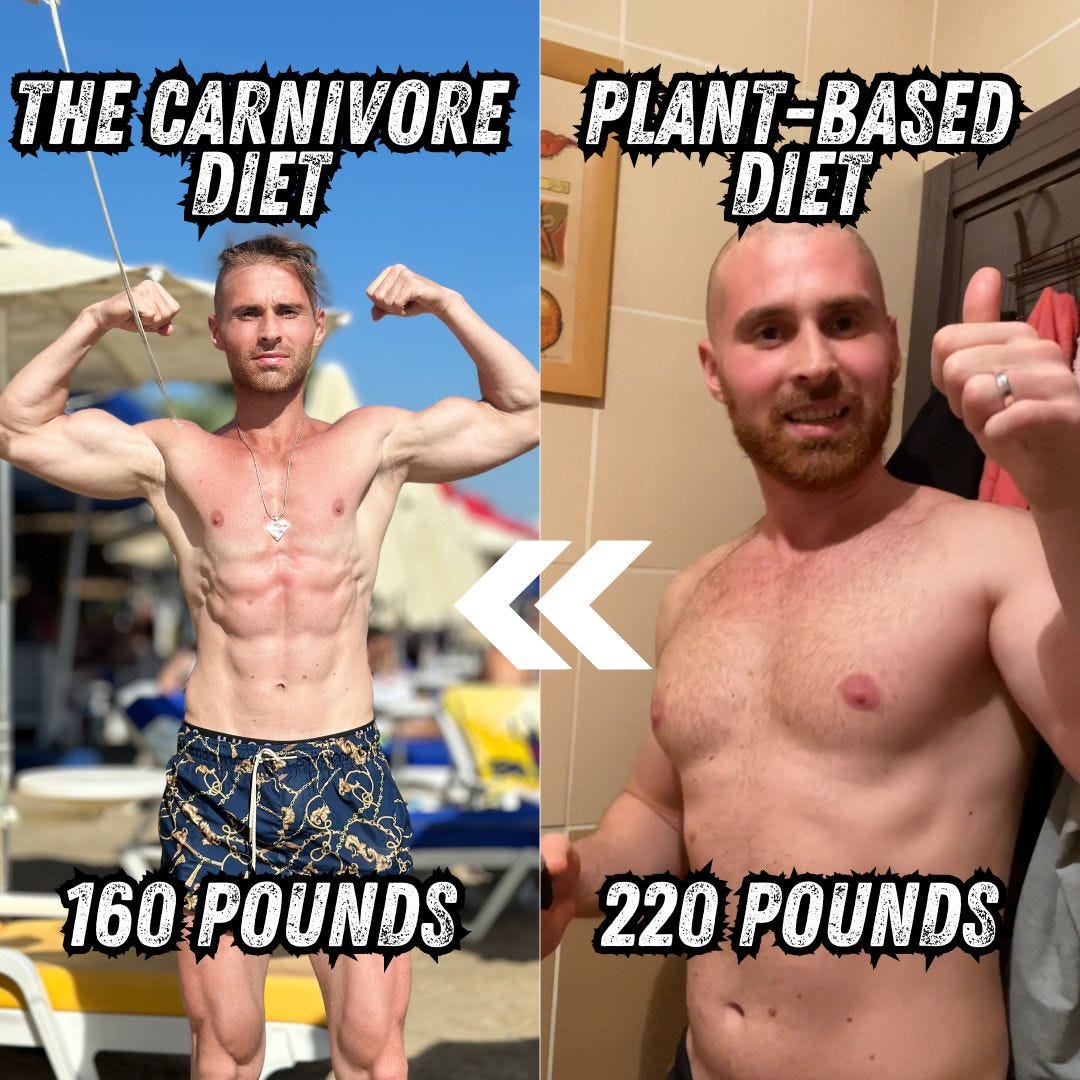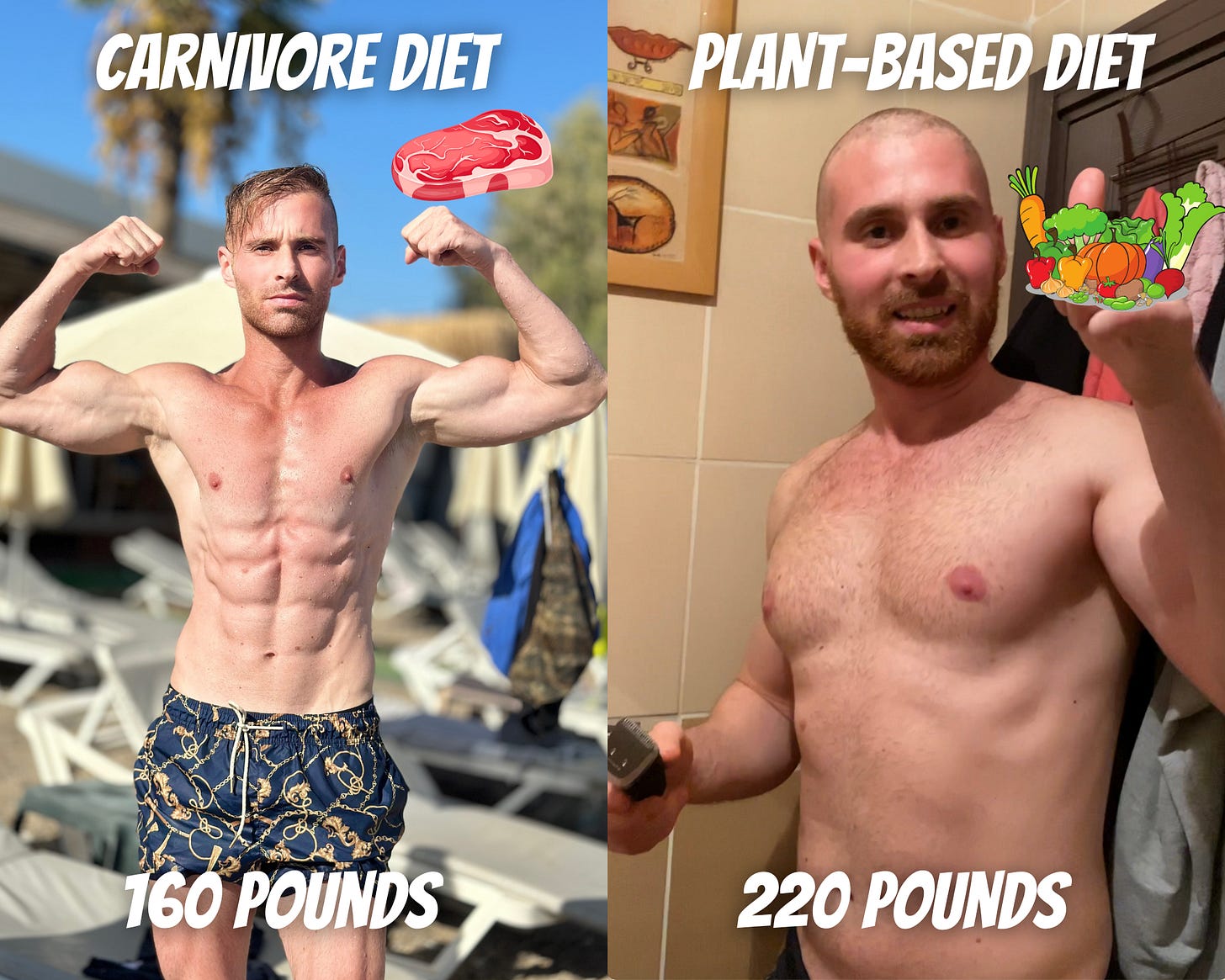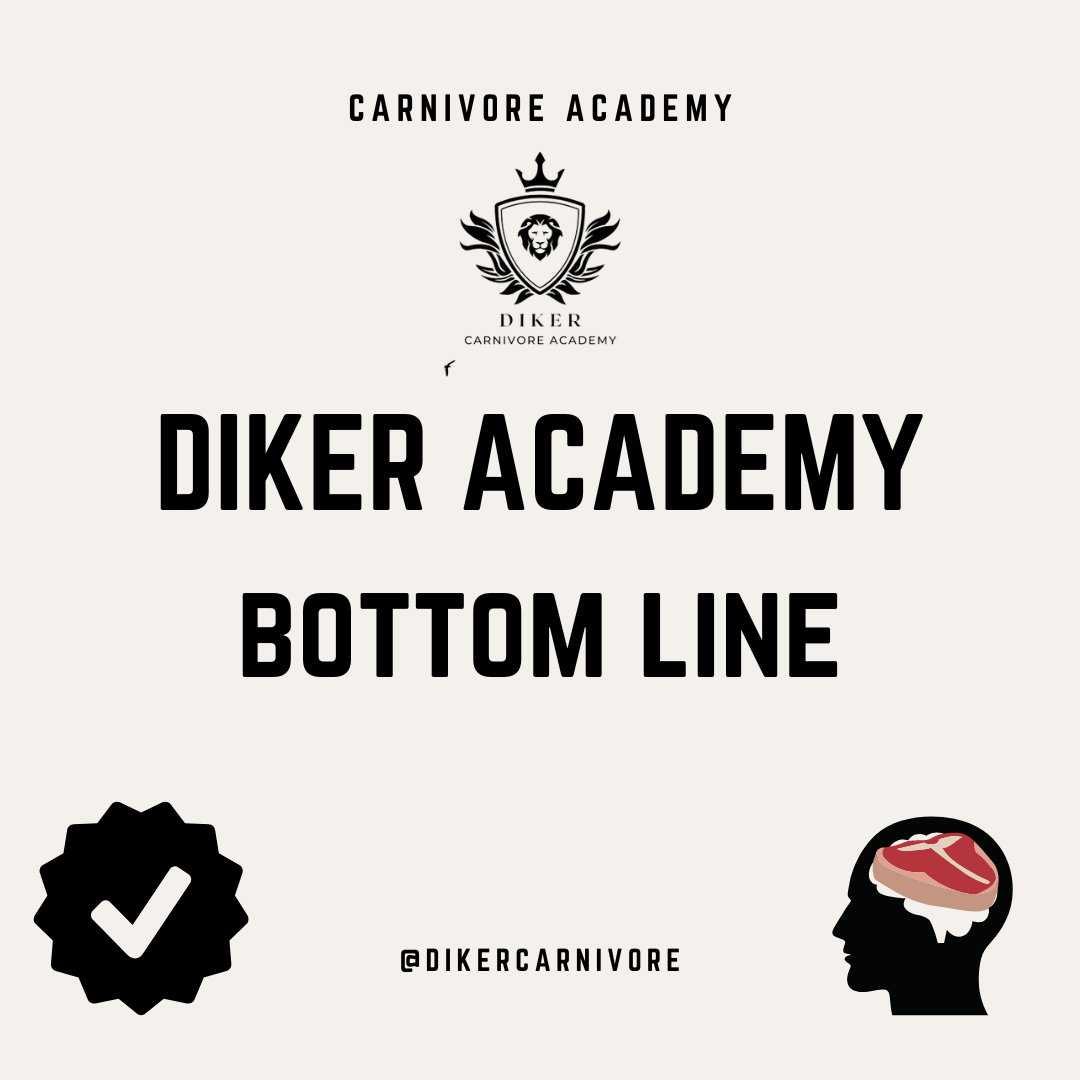Vegan to Carnivore: Reasons and Testimonials
Having personally experienced the challenges of being a vegan I would like to share with you my experience
Embarking on the path from a vegan lifestyle to embracing a carnivorous diet might appear to be an unexpected shift. However, as individuals strive to enhance their health and overall well-being through dietary choices, they often find themselves exploring a wide array of options to discover the one that best aligns with their personal values and health ambitions.
In this discussion, we will delve into the reasons for moving from a vegan diet to a carnivorous one, taking into account ethical implications and the latest advancements in nutritional science. Additionally, we will share experiences from individuals who have successfully made this dietary transition, offering real-life insights and inspiration.
Vegan versus Carnivore: A Nutritional Debate
At first glance, vegan and carnivore diets appear to be at opposite ends of the dietary spectrum. Vegans completely avoid all animal-derived foods. In contrast, those following a carnivore lifestyle exclude all plant-based foods, such as vegetables, legumes, nuts, grains, and fruits, focusing solely on consuming animal products that are unprocessed.
Despite these apparent differences, the motivations behind choosing either diet often align closely. Both vegans and carnivore enthusiasts are in pursuit of optimal nutritional health. Although vegans prominently prioritize animal rights, many carnivores also support ethical animal treatment and environmental sustainability by selecting animal products raised through responsible and regenerative agricultural methods.
In essence, both groups are driven by a desire to align their dietary choices with broader health and ethical values, albeit through distinctly different approaches. Whether seeking personal health benefits or advocating for ecological responsibility, each group exemplifies a commitment to understanding and improving their impact on personal well-being and the world around them.
Why do Individuals Shift from Vegan to Carnivore?
Many individuals choose to move from a vegan lifestyle to a carnivore diet for a variety of compelling reasons. One significant factor is the nutritional shortcomings often associated with a vegan diet, which can lead to deficiencies that animal products naturally fulfill due to their superior nutrient density.
Additionally, switching to a carnivore diet helps individuals cleanse their bodies of plant toxins and antinutrients that can cause harm. Many find relief from digestive discomfort and issues related to intestinal permeability by eliminating these plant-based elements and reducing fiber intake.
Furthermore, some people become aware of the environmental impact of cultivating plant foods, acknowledging the unintended harm or death of countless animals and billions of insects in the process.
Some example;
Better Gut Health
Better Mental Health
Better Heart Health
Lower Inflammation
Nutrient Density and Necessity
Animal-derived foods are packed with nearly every vital macro and micronutrient essential for optimal health, delivered in perfectly balanced ratios and the most absorbable forms. These foods are indispensable sources of certain nutrients that are exclusively found in meat. These include:
- Vitamin D3
- Vitamin B12
- Vitamin A (Retinol)
- Creatine
- Choline
- Carnitine
- Carnosine
- Heme iron
- Docosahexaenoic acid (DHA)
- Eicosapentaenoic Acid (EPA)
- Conjugated linoleic acid
- Vitamin K2
- Taurine
- Selenium
In addition, they provide a variety of amino acids like tyrosine and tryptophan, which are crucial for various bodily functions. By incorporating these nutrients into your diet, you ensure your body receives the necessary components to function efficiently and support overall well-being.
Plant Toxins
Most plant-based foods are rich in natural pesticides and chemicals designed to protect plants from threats like pests and predators, which can also pose risks to humans.
A vegan lifestyle often involves repeated exposure to significant amounts of potentially harmful plant toxins and antinutrients, such as:
Oxalates
Histamines
Phytohormones
Salicylates
Trypsin inhibitors
Lectins
These substances have the potential to trigger various allergies, autoimmune disorders, leaky gut syndrome, and persistent inflammation.
MY STORY VEGAN TO CARNIVORE
Having personally experienced the challenges of being a vegan, I understand the struggle and the toll it can take on one's physical and mental health. From battling mental disorders, heart issues, kidney stones, acne, eczema, dental problems, brain fog, and sleep disorders, to food addiction, I have faced them all.
For 30 years, I believed that meat was a leading cause of cancer, that cholesterol was dangerous, and that carbohydrates, grains, and vegetables were essential for a healthy diet. I even avoided consuming egg yolks and steered clear of butter, convinced that they were detrimental to my well-being. But when I discovered the Carnivore Diet, everything changed.
Initially, it was difficult for me to accept the idea that a diet centered around animal products could be the key to optimal health. However, after immersing myself in the science and testimonials surrounding this lifestyle, I began to awaken from my slumber.
Now, I am not just living a healthier life; I am in complete control of my life. The Carnivore Diet has empowered me to take charge of my body and mind, allowing me to thrive in ways I never thought possible. It is more than just a diet; it is a transformative experience that has unlocked a new level of mental clarity and physical well-being.
TESTIMONIALS
Irvin Dazl St-Louis has been an athlete, dancer/street performer, and vegan for 21 years, but after a series of events decided to reintroduce meat into his diet in 2017, which culminated in going full Carnivore in 2022.
Plant-Based Doctor Turns Carnivore!
People practice vegan and carnivore diets for various reasons ranging from animal welfare and environmental issues to improving mental health, reducing inflammation, and overcoming metabolic disorders.
The carnivore diet consistently proves superior by almost every standard. This holds true even in terms of animal welfare, especially when focusing on consuming pasture-raised beef and ethically sourced animal products.
Vegan diets contribute to the destruction of countless animals and trillions of insects each year to produce plant-based foods that offer significantly less nutrition compared to animal-derived products.
Historically, animals have been integral to human nutrition, and backing the production of pasture-raised regenerative meat causes considerably less ecological damage than mainstream vegan practices.
Transform your body and lifestyle with the revolutionary DIKER CARNIVORE 61 Days Effortless Weight Loss Challenge.
This innovative program breaks all the rules of traditional dieting, offering a refreshing approach to sustainable weight loss.
Key Benefits:
•Sustainable Results: Learn habits that last a lifetime
•Time-Efficient: Perfect for busy schedules
•Cost-Effective: No expensive gym memberships or equipment
•Expert-Designed: Created by nutrition and fitness professionals
•Holistic Approach: Address both diet and lifestyle








